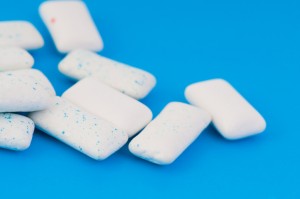 When asked to come up with a list of foods that dentists hate, gum will almost certainly appears in your top five. After all, this sticky, chewy candy can leave your jaw sore and work its way into tricky places in your smile – not to mention that it’s a natural enemy of traditional braces. But have you heard that the treat can actually improve the health of your teeth and gums instead of hurting them? It’s true! The American Dental Association has officially recognized that specific types of sugarless chewing gum have been scientifically proven to bolster optimal dental health.
When asked to come up with a list of foods that dentists hate, gum will almost certainly appears in your top five. After all, this sticky, chewy candy can leave your jaw sore and work its way into tricky places in your smile – not to mention that it’s a natural enemy of traditional braces. But have you heard that the treat can actually improve the health of your teeth and gums instead of hurting them? It’s true! The American Dental Association has officially recognized that specific types of sugarless chewing gum have been scientifically proven to bolster optimal dental health.
Chew Up a Storm and Keep Smiling
The act of chewing gum helps to increase the flow of saliva in your mouth, which can help clear away stray food particles and acids that are left by bacteria. Over time, these acids can wear down your tooth enamel and cause unwanted damage and decay. More saliva helps relieve this problem while also bringing with it more calcium and phosphate, which help to strengthen enamel. By chewing sugarless gum after meals for around twenty minutes, you can effectively keep your teeth cleaner than ever before!
Of course, chewing gum is not an adequate substitute or replacement for brushing and flossing. Instead, these techniques should be used in conjunction in order to ensure that your teeth and gums stay as healthy as possible through the years. The ADA recommends brushing twice a day with toothpaste that contains fluoride and flossing at least once.
Additionally, when choosing gum to chew, look for the ADA seal. This is a reliable assurance that the product will be safe and effective for your oral health. As of right now, the choices of gum that have earned this seal are sugarless, having been sweetened by non-cavity inducing products. While gum that contains sugar also helps to increase the production of saliva, it can also lead to an increased risk of cavities.
Be sure to talk to your local dentist if you have any concerns about chewing gum!